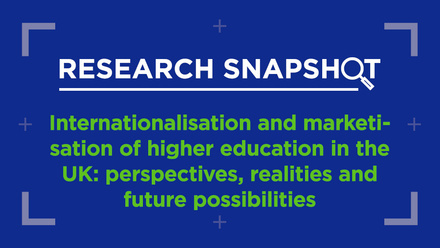Matching the right international student to your institution

Understanding the background and interests of international students when seeking opportunities to study abroad is crucial when developing your international recruitment strategies. Depending on the profile of your institution you can target the right student for your academic programming. Hence, we can categorise international students into the following segments.
Academic seekers
This type of student is highly interested in the academic standards and research strengths of your institution. They are well-prepared students with top-class grades who are looking to further develop their academic skills and are inclined to already have a plan to pursue graduate studies. These students may or may not have the necessary financial resources to support their studies abroad so providing comprehensive scholarships is a way to diversify your international student body. The return on investment in these students is high as they will be good ambassadors as alumni while also supporting the research endeavours of your faculty members, thus contributing towards your international rankings and research impact.
Credential seekers
Students with low academic backgrounds and/or with low financial resources are often pursuing an education abroad to gain credibility for their academic and leadership skills. These individuals understand the power of attaining an international education that will provide them with various opportunities for employment after graduation either in their home country or the country where they studied. Programmes with hands-on experience such as paid internships and practicums are of their interest. Academic institutions that offer multiple options for on-campus work, as well as countries with flexible working hours for international students, are ideal for credential seekers.
Experience seekers
Some students are more interested in the student life that their future academic institution has to offer. This could be colleges and universities that offer an innovative learning model along with student engagement events throughout the academic year and during school breaks. Further, it could be also focused on the location of your institution. For example, students interested in being active may tend to go to institutions that are located in regions nearby nature where they can climb, hike, ski, or surf. Others may be interested in arts and culture, so cities with various art galleries and museums are what they are looking for. Further, some students are inclined to urban and cosmopolitan lifestyles, so major cities such as Amsterdam, London, Mexico City and New York, among others, are their ideal study destinations.
Understanding the background and interests of international students is crucial when developing your international recruitment strategies
Immersion seekers
Students are also keen to be immersed in the breadth of culture that their host country has to offer. These individuals are looking for higher education institutions where they can have more involvement with domestic students and locals. They are also interested in improving their language skills so that they can master their grammar, pronunciation and spelling. Colleges and universities that are located in rural areas or small cities, towns or villages, are ideal for immersion seekers as not a lot of international students would tend to go there.
Immigration seekers
This category of students is looking for immigration pathways. Academic institutions where their governments offer streamline programmes for graduates to receive post-study work permits, and to become permanent residents, can capitalise on these policies. Individuals from families with low financial resources, who come from developing countries or countries experiencing local political turmoil tend to look to international education as a way to seek a life in a more stable country.
Status seekers
The prestige that is attached to your higher education institution plays a role when recruiting international students. For example, studying in Canada at a U15 institution (Canada’s 15 research-intensive universities), or in the United Kingdom at a Russell Group university, or in the United States at an Ivy League school, provides the students with a life-long reputation and status as an alumnus. In addition to the status gained, individuals have access to top researchers, industry experts, opportunities of networking with future leaders and with reputable employers.
Conversely, if you are not a tier-one higher education institution, the prestige that you provide to international studies is attached to the location where your college or university is located. For instance, there is a certain prestige attached to being able to say that you studied in Paris as it is an international hub. Moreover, studying at Cambridge in the United Kingdom is highly rewarded. However, as admission to the University of Cambridge is so competitive, students can look at A.R.U. University instead, the only other university in the city of Cambridge. In addition to being able to say that you studied in Cambridge, A.R.U. University students profit from the opportunity to interact and network with University of Cambridge students off-campus in local events, open lectures, restaurants and pubs.
Once you identify your type of academic institution and the strengths of the location where your college or university is located, you can highlight the uniqueness and competitive advantages that you can offer to international students.






